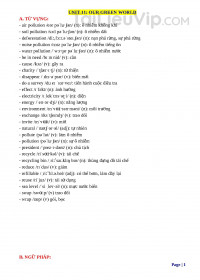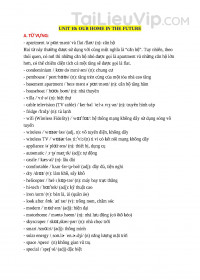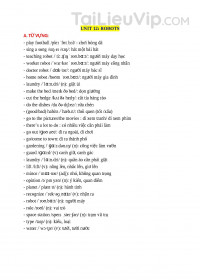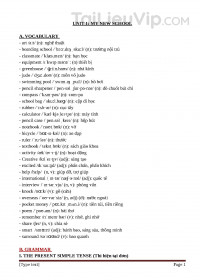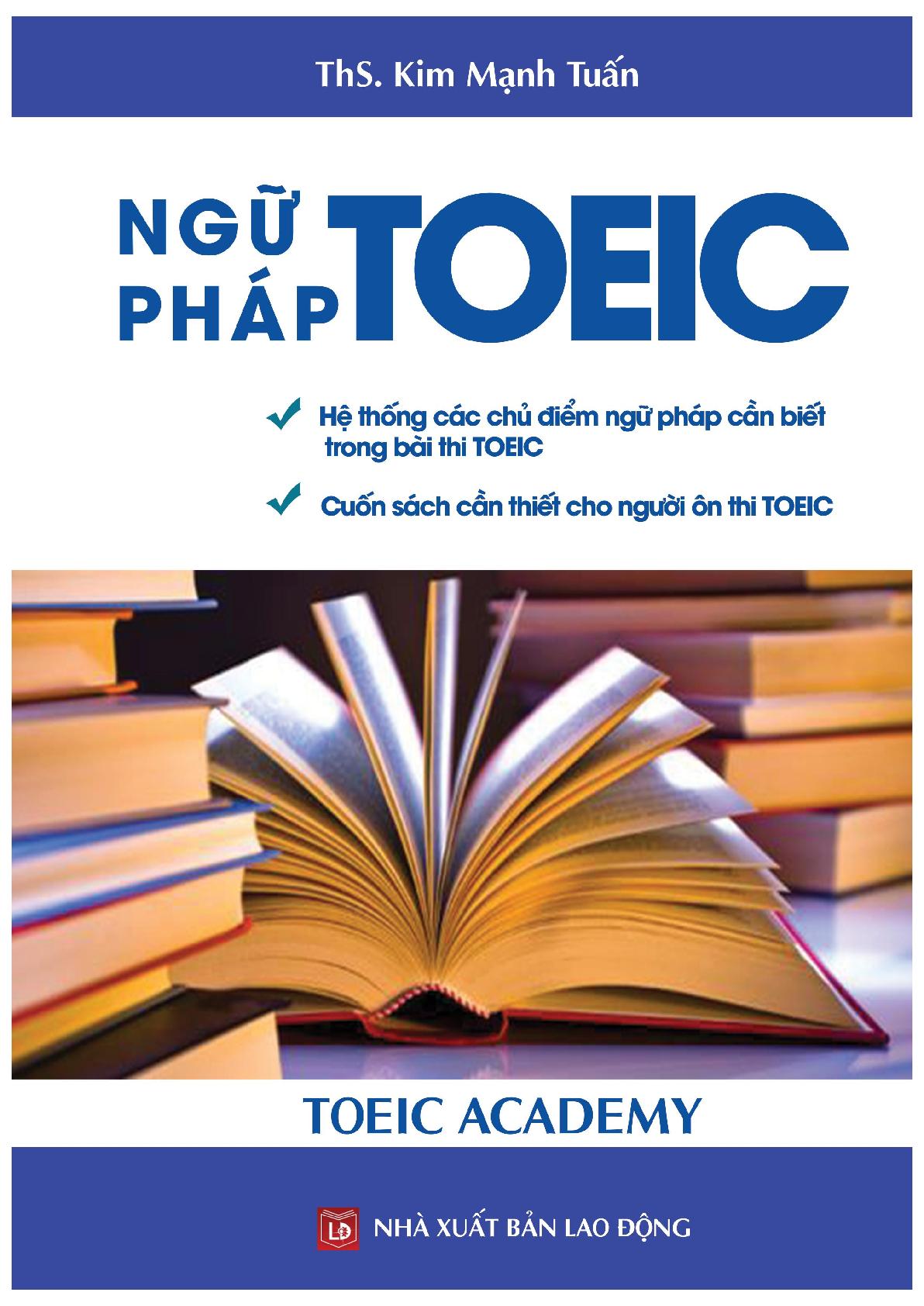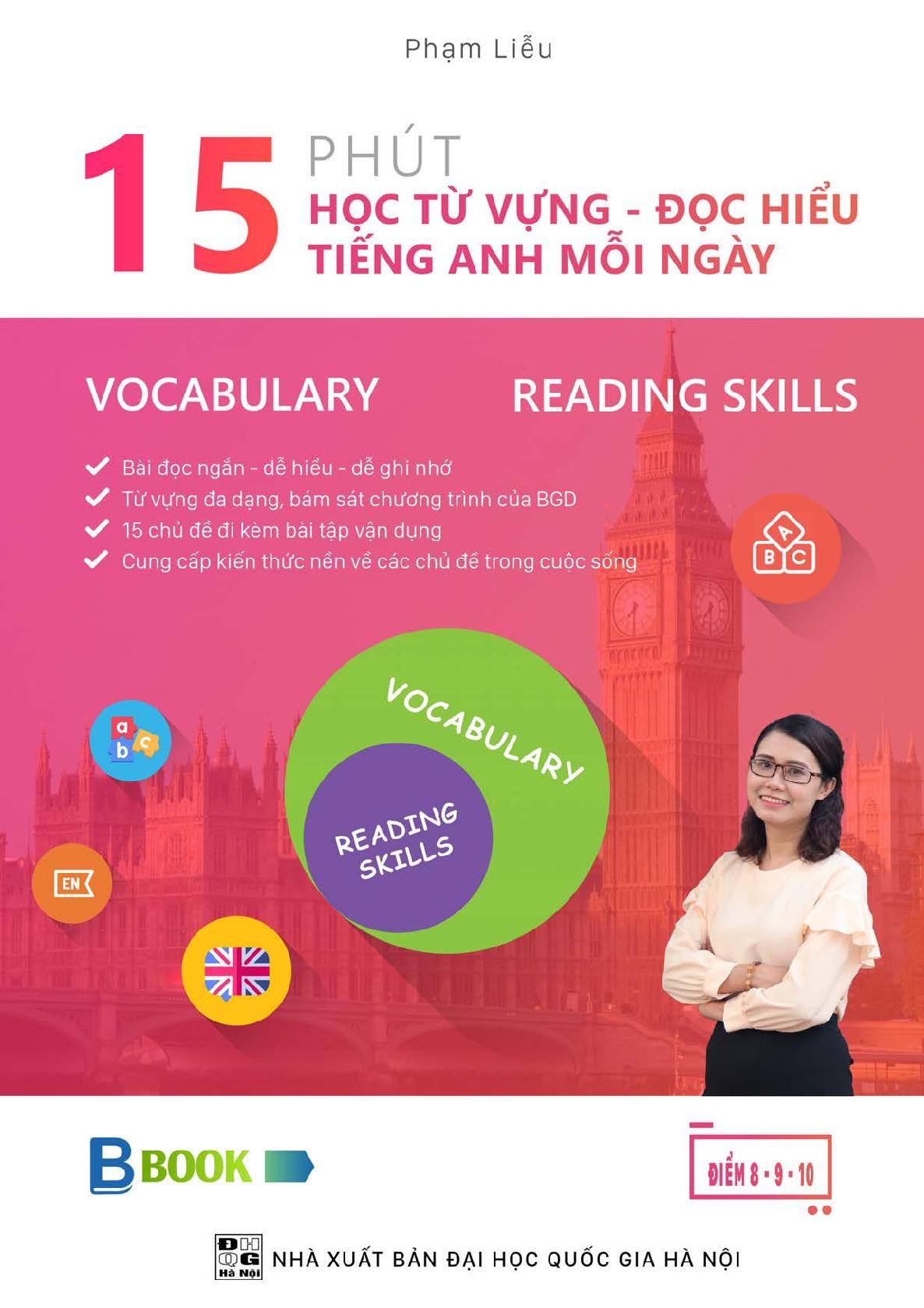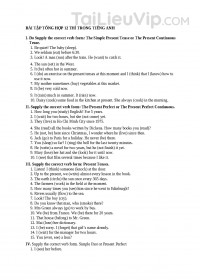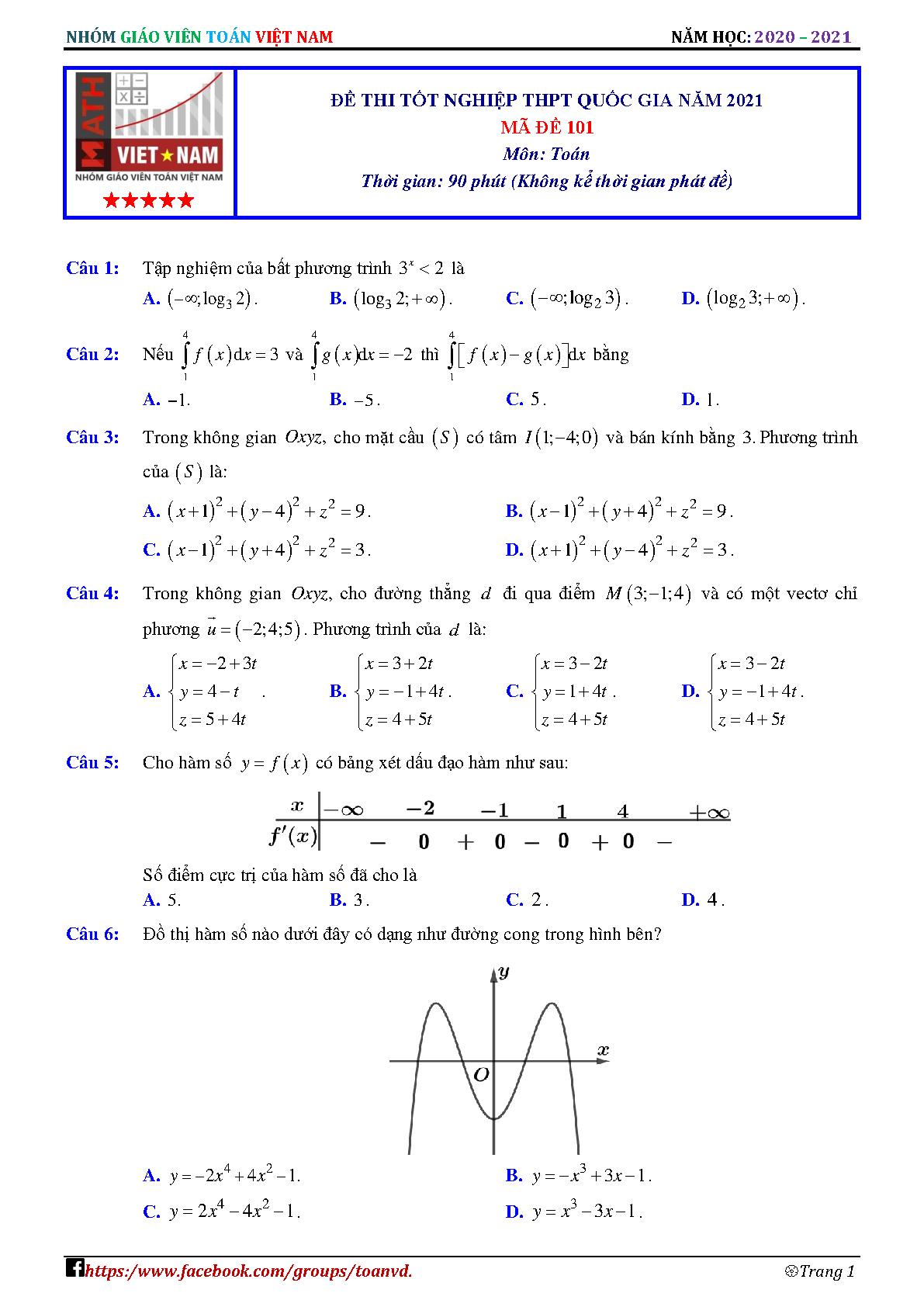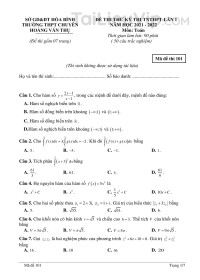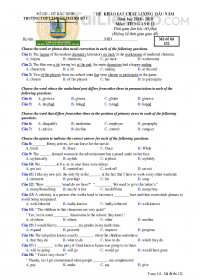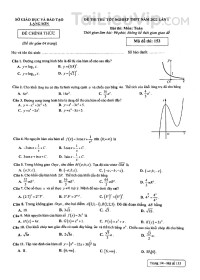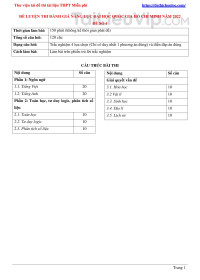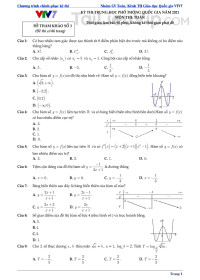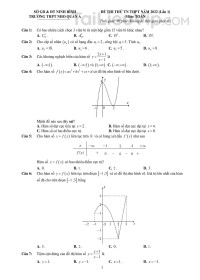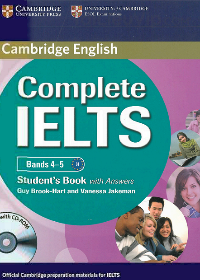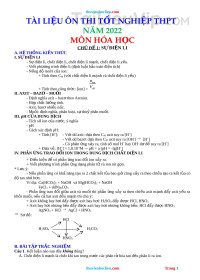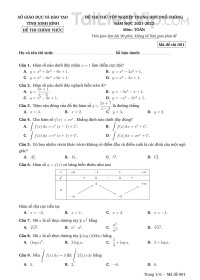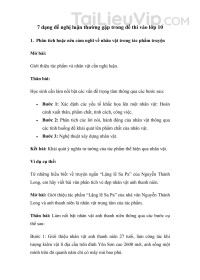Bài tập Tiếng Anh 6 Unit 8: Sports and Games (Chương trình mới)
1,081 3

Tải về máy để xem đầy đủ hơn, bản xem trước là bản PDF
Tags: #bài tập tiếng anh 6 theo từng unit#bài tập tiếng anh 6 chương trình mới#bài tập tiếng anh 6 unit 8
Mô tả chi tiết
UNIT 8: SPORTS AND GAMES
A. TỪ VỰNG:
- badminton /ˈbædˌmɪn·tən/ (n): cầu lông
- volleyball /ˈvɑl·iˌbɔl/ (n): bóng chuyền
- football /ˈfʊtˌbɔl/ (n): bóng đá
- judo /ˈdʒud·oʊ/ (n): võ nhu đạo
- horse race /hɔːrs ˈreɪs/ (n): đua ngựa
- basketball /ˈbæs·kɪtˌbɔl/ (n): bóng rổ
- baseball /ˈbeɪsˌbɔl/ (n): bóng chày
- tennis /ˈten·ɪs/ (n): quần vợt
- table tennis /ˈteɪ·bəl ˌten·ɪs/ (n): bóng bàn
- regatta /rɪˈɡɑː.t̬ə/ (n): cuộc đua thuyền
- eurythmies /yʊˈrɪð mi, yə-/ (n): thể dục nhịp điệu
A. TỪ VỰNG:
- badminton /ˈbædˌmɪn·tən/ (n): cầu lông
- volleyball /ˈvɑl·iˌbɔl/ (n): bóng chuyền
- football /ˈfʊtˌbɔl/ (n): bóng đá
- judo /ˈdʒud·oʊ/ (n): võ nhu đạo
- horse race /hɔːrs ˈreɪs/ (n): đua ngựa
- basketball /ˈbæs·kɪtˌbɔl/ (n): bóng rổ
- baseball /ˈbeɪsˌbɔl/ (n): bóng chày
- tennis /ˈten·ɪs/ (n): quần vợt
- table tennis /ˈteɪ·bəl ˌten·ɪs/ (n): bóng bàn
- regatta /rɪˈɡɑː.t̬ə/ (n): cuộc đua thuyền
- eurythmies /yʊˈrɪð mi, yə-/ (n): thể dục nhịp điệu

Nội dung
UNIT 8: SPORTS AND GAMESA. TỪ VỰNG:- badminton /ˈbædˌmɪn·tən/ (n): cầu lông- volleyball /ˈv ɑ l·iˌbɔl/ (n): bóng chuyền- football /ˈfʊtˌbɔl/ (n): bóng đá- judo /ˈdʒud·oʊ/ (n): võ nhu đạo- horse race /hɔ ː rs ˈreɪs/ (n): đua ngựa- basketball /ˈbæs·kɪtˌbɔl/ (n): bóng rổ- baseball /ˈbeɪsˌbɔl/ (n): bóng chày- tennis /ˈten·ɪs/ (n): quần vợt- table tennis /ˈteɪ·bəl ˌten·ɪs/ (n): bóng bàn- regatta /rɪˈ ɡɑː .t̬ə/ (n): cuộc đua thuyền- eurythmies /yʊˈrɪð mi, yə-/ (n): thể dục nhịp điệu- gymnastics /dʒɪmˈnæs·tɪks/ (n): thể dục dụng cụ- marathon /ˈmær·əˌθ ɑ n/ (n): cuộc đua ma-ra-tông- marathon race /ˈmær·əˌθ ɑ n reɪs/ (n): chạy ma-ra-tông- javelin throw /ˈdʒæv·ə·lɪn θroʊ/ (n): ném lao- pole vault /ˈpoʊl ˌvɔlt/ (n): nhảy sào- athletics /æθˈlet̬·ɪks/ (n): điền kinh- hurdle rate /ˈhɜr·dəl reɪt/ (n): nhảy rào- weightlifting /ˈweɪtˌlɪf·tɪŋ/ (n): cử tạ- swimming /ˈswɪm·ɪŋ/ (n): bơi lội- ice-skating /ˈ ɑɪ s ˌskeɪt/ (n): trượt băng- water-skiing /ˈwɔ·t̬ər ˈski ː .ɪŋ/ (n): lướt ván nước- high jumping /ˈhaɪˌdʒʌmp/ (n): nhảy cao- archery /ˈ ɑ r·tʃə·ri/ (n): bắn cung- windsurfing /ˈwɪndˌsɜr·fɪŋ/ (n): lướt ván buồm- cycling /ˈsaɪ klɪŋ/ (n): đua xe đạp- fencing /ˈfen·sɪŋ/ (n): đấu kiếm- hurdling /ˈhɜr·dəlɪŋ/ (n): chạy / nhảy qua rào- athlete /ˈæθˌlit/ (n): vận động viên- boat /boʊt/ (n): con thuyền- career /kəˈrɪər/ (n): nghề nghiệp, sự nghiệp- congratulations /kənˌ ɡ rætʃ·əˈleɪ·ʃənz/ (n): xin chúc mừng- elect /ɪˈlekt/ (v): lựa chọn, bầu chọn- equipment /ɪˈkwɪp mənt/ (n): thiết bị, dụng cụ- exhausted /ɪɡˈz ɑː .stɪd/ (adj): mệt nhoài, mệt lử- fantastic /fænˈtæs·tɪk/ (adj): tuyệt- fit /fɪt/ (adj): mạnh khỏePage | 1- goggles /ˈɡɑɡ·əlz/ (n): kính (để bơi)- gym /dʒɪm/ (n): trung tâm thể dục- last /læst/ (v): kéo dài- racket /ˈræk·ɪt/ (n): cái vợt (cầu lông...)- regard /rɪˈgɑrd/ (v): coi là- ring /rɪŋ/ (n): sàn đấu (boxing)- skateboard /ˈskeɪt.bɔːrd/: (n, v) ván trượt, trượt ván- ski /ski/ (n, v): trượt tuyết, ván trượt tuyết- skiing /ˈskiː.ɪŋ/ (n): môn trượt tuyết- sports competition /spɔːrts ˌkɒm pɪˈtɪʃ ən/ (n): cuộc đua thể thao- sporty /ˈspɔːr.t̬i/ (adj) khỏe mạnh, dáng thể thaoB. NGỮ PHÁP:I. THE PAST SIMPLE TENSE (Thì quá khứ đơn)* THÌ QUÁ KHỨ ĐƠN VỚI ĐỘNG TỪ "TO BE"- Động từ "to be" ở thì quá khứ đơn có hai dạng là "was" và "were".1.1. Khẳng định: CHÚ Ý:S = I/ He/ She/ It (số ít) + wasS = We/ You / They (số nhiều) + wereVí dụ:I was very tired yesterday. (Ngày hôm qua tôi cảm thấy rất mệt.)My parents were in Nha Trang on their summer holiday last year.(Năm ngoái bố mẹ tôi đi nghỉ mát ở Nha Trang.)1.2. Phủ định: CHÚ Ý: was not = wasn't were not = weren'tVí dụ:My brother wasn't happy last night because of losing money.(Tối qua anh trai tôi không vui vì mất tiền)Page | 2S + was/ wereTrong đó: S (subject): chủ ngữS + was/were + notĐối v ớ i câu phủ định ta ch ỉ c ầ n thêm "not" vào sauđộng từ "to be".We weren't at home yesterday. (Hôm qua chúng tôi không ở nhà.)1.3. Câu hỏi:Ví dụ:Was she tired of hearing her customer's complaint yesterday?(Cô ấy có bị mệt vì nghe khách hàng phàn nàn ngày hôm qua không?)Yes, she was./ No, she wasn't. (Có, cô ấy có./ Không, cô ấy không.)Were they at work yesterday? (Hôm qua họ có làm việc không?Yes, they were./ No, they weren't. (Có, họ có./ Không, họ không.)* THÌ QUÁ KHỨ ĐƠN VỚI ĐỘNG TỪ THƯỜNG.1. Cách dùng* Thì quá khứ đơn diễn tả một sự việc xảy ra và kết thúc tại một thời điểm trong quá khứ.Vi dụ: I played football yesterday afternoon. (Tôi chơi bóng đá chiều hôm qua.)* Diễn tả một sự việc xảy ra trong một khoảng thời gian ở quá khứ và đã kết thúc hoàn toàn ở hiện tại.Được dùng với các cụm từ như: for + khoảng thời gian; from…to…Ví dụ: I played football for 3 years. (Tôi chơi bóng đá được 3 năm). We were in the boat from Monday to Friday of last week. (Chúng tôi đã ở trên con thuyền này từ thứ Hai đến thứ Sáu tuần trước.)Page | 3Were/ Was + S ? Yes, S + was/ were. No, S + wasn't/ weren't.Câu hỏi ta chỉ cần đảo động từ "to be" lên trước chủ ngữ.* Diễn tả một chuỗi các hoạt động xảy ra kế tiếp nhau trong quá khứ.Ví dụ: She came home, switched on the computer and played game. (Cô ấy về nhà, khởi động máy tính và chơi game.)2. Cấu trúc câu:a. Câu khẳng định: S + V-ed/P2 Ví dụ: I played basketball with my friends yesterday afternoon. (Hôm qua tôi chơi bóng rổ với các bạn tôi.) He went to the gym last week. (Tuần trước anh ấy đến phòng tập.)b. Câu phủ định: S + did not/ didn't + V-infinitiveVí dụ: We didn’t ski last summer. (Chúng tôi không trượt tuyết mùa đông năm ngoái.) Nam didn’t play table tennis. (Nam không chơi bóng bàn hôm qua.)c. Câu hỏi nghi vấn: Did + S + V-infinitive?Câu trả lời: Có 2 cách: Yes, S+ did (Có…)No, S+ did n’t. (Không…)Ví dụ: Did you take in cycling last month? (Tháng trước cậu tham gia đua xe không?) Yes, I did. (Có.) Did he skateboard yesterday? (Hôm qua anh ấy có chơi lướt ván không?) No, He didn’t. (Không)3. Dạng quá khứ của động từ thường.a. Dạng quá khứ của động từ theo quy tắc.Thêm -ed vào sau những động từ theo quy tắc khi chia ở thì quá khứ đơn.Ví dụ: Last year, she worked for a big company. (Năm ngoái, cô ấy đã làm việc cho một công ty lớn.) Last night, he watched a football match. (Đêm qua anh ấy đã xem bóng đá.)Quy tắc thêm –ed Động từ kết thúc bằng "-e" thêm "-d" vào sau động từ.Ví dụ: arrive – arrived Động từ có một âm tiết hoặc có hai âm tiết nhưng trọng âm rơi vào âm tiết thứ 2 và động từ đó kết thúc bằng một nguyên âm + một phụ âm: Gấp đôi phụ âm cuối và thêm -ed.Ví dụ: stop - stopped, prefer - preferred. Động từ kết thúc bằng một phụ âm và "-y" ta chuyển "–y" thành "-i" và thêm "-ed".Ví dụ: study – studiedPage | 4 Động từ kết thúc bằng một nguyên âm và "-y" ta thêm "-ed".Ví dụ: play - played Cách phát âm đuôi -edPhát âm là /ɪd/ khi âm tận cùng của động từ nguyên thể là /t/, /d/.Ví dụ: started , needed , wanted…..Phát âm là /t/ khi âm tận cùng của động từ nguyên thể là /k/, /s/, /ʃ/, /f/, /p/, /tʃ/.Ví dụ: looked , dressed , washed , laughed , stopped , watchedPhát âm là /d/ khi âm tận cùng của động từ nguyên thể là các âm còn lại.Ví dụ: smiled , playedb. Dạng quá khứ của động từ bất quy tắcCách chia động từ bất quy tắc: Xem ở cột 2 trong bảng động từ bất quy tắc hoặc tra từ điển dạng thức quá khứ của các động từ này.Ví dụ: go- went have- had buy - bought4. Các trạng từ chỉ thời gian trong quá khứ.Yesterday : Ngày hôm quaYesterday morning: Sáng ngày hôm qua.Yesterday afternoon: Chiều hôm qua.Yesterday evening : Tối hôm qua(Two days, three weeks) ago : Hai ngày trước, ba tuần trước….Last (year, month, week): Năm ngoái, tháng trướng, tuần trướcIn (2002, June): Năm 2002, vào tháng 6.From ….. to ….. : Từ thời điểm nào đến thời điểm nào.In the (2000s, 1980s): Vào những năm 2000, 1980.In the last century : Vào thế kỷ trước.In the past: Trước đây.II. IMPERATIVE MOOD (MỆNH LỆNH THỨC)Mệnh Lệnh thức là một thể sai khiến, ra lệnh, hay yêu cầu người khác làm một điều gì.Chủ ngữ của câu mệnh lệnh được ngầm hiểu là “you”. Luôn dùng dạng thức nguyên thể (không có to) của động từ trong câu mệnh lệnh. Câu mệnh lệnh được chia làm 2 loại: Trực tiếp và gián tiếp. 1. Câu mệnh lệnh trực tiếp: Cách dùng: Dùng để ra lệnh, sai khiến hoặc đề nghị ai làm điều gì. Nó được bắt đầu bằng một động từ nguyên mẫu không "to". Cách thành lập: Verb + Object hay Verb + Prepositon. Ví dụ: Close the door! ( Đóng cửa lại.) Get out of here! ( Ra khỏi đây.)Page | 52. Câu mệnh lệnh gián tiếp:Thường được dùng với: to order/ ask/ say/ tell sb to do smt.VD: John asked Jill to turn off the light. (John bảo Gill tắt đèn đi)Please tell Jaime to leave the room. (Hãy bảo Jaime rời khỏi phòng)3. Dạng phủ định của câu mệnh lệnh: Cách dùng: Dùng để ra lệnh, yêu cầu hoặc đề nghị ai đo đừng làm điều gì. Cách thành lập: "Do not (don't) +V- infinitive + Object. Ví dụ: Don't pick flowers. ( Đừng ngắt hoa.) Don't beat your friends. ( Không được đánh bạn.)4. Câu mệnh lệnh có thể được thành lập với cấu trúc:Let + Object + V-infinitiveVí dụ: Let me see. (Hãy để tôi xem nào) Let us go: (Hãy để chúng tôi đi) C. BÀI TẬP VẬN DỤNG:❶ . PHONETICSI. Choose the words whose underlined part is pronounced differently from that of the others in each group.1. A. h ea r B. f ea r C. d ea r D. w ea r2. A. n ea r B. app ea r C. b ea r D. id ea3. A. h e re B. th e re C. s e ries D. sph e re4. A. h a te B. a ir C. ch a ir D. h ai r5. A. prep a re B. c a rry C. sh a re D. f a ir6. A. ae robic B. air play C. r are ly D. atmosph ere7. A. unf ai r B. prep are C. n ea rly D. air plane8. A. f ai ry B. r ea lly C. volunt ee r D. id ea9. A. p a rent B. reind ee r C. upst air s D. c are ful10. A. c are less B. downst air s C. armch air D. f ear ful11. A. squ a re B. b a dminton C. gr a ndfather D. m a tch12. A. id ea B. r ea son C. f ea ture D. t ea cher13. A. ea sy B. l ea se C. w ea k D. p ea r14. A. g o ggles B. sp o rt C. st o p D. n o t15. A. mat ch B. ma ch ine C. ch ampion D. ch ess16. A. f ea r B. n ea r C. r ea lly D. w ea r17. A. th ei r B. h ai r C. s e ries D. th e re18. A. sp a re B. pl a y C. g a me D. t a ble19. A. k ee p B. ch ee r C. m ee t D. w ee k20. A. sph e re B. s e ries C. h e re D. wh e re21. a. fr ee b. t ea m c. r ea d d. id eaPage | 622. a. sw i mming b. sk i pping c. dr i ving d. f i shing23. a. r a cket b. sk a teboard c. g a mes d. pl a yer24. a. th ing b. fa th er c. heal th y d. th ree25. a. racket s b. goggle s c. ski s d. skateboard s26. A. th ink B. th at C. th eatre D. th ere 27. A. mo th er B. th rough C. lea th er D. ei th er28. A. th em B. th ey C. some th ing D. th is29. A. th irty B. th ough C. fif th D. th anks30. A. every th ing B. bro th er C. th eory D. bo th31. A. r ou gh B. s u m C. u tter D. u nion32. A. n oo n B. t oo l C. bl oo d D. sp oo n33. A. ch emist B. ch icken C. ch urch D. cen t ury34. A. th ou ght B. t ou gh C. t au ght D. b ou ght35. A. pl ea sure B. h ea t C. m ea t D. f ee d36. A. ch alk B. ch ampagne C. ma ch ine D. sh ip37. A. kn i t B. h i de C. t i de D. fl y38. A. p u t B. c ou ld C. p u sh D. m oo n39. A. h ow B. t ow n C. p ow er D. sl ow40. A. talk ed B. nak ed C. ask ed D. lik ed41. A. h ea r B. cl ea r C. b ea r D. ea r42. A. h ea t B. gr ea t C. b ea t D. br ea k43. A. bl oo d B. p oo l C. f oo d D. t oo l44. A. u niversity B. u nique C. u nit D. u ndo45. A. m ou se B. c ou ld C. w ou ld D. p u t46. A. f ai thful B. f ai lure C. f ai rly D. f ai nted47. A. c ou rse B. c ou rt C. p ou r D. c ou rage48. A. work ed B. stopp ed C. forc ed D. want ed49. A. n ew B. s ew C. f ew D. neph ew50. A. s un B. s ure C. s uccess D. s ortII. Choose the word whose main stressed syllable is placed differently from that of the other in each group.1. A. basketball B. athlete C. career D. skateboard2. A. equipment B. fantastic C. replace D. sporty3. A. pastime B. aerobics C. football D. swimming4. A. volunteer B. competition C. explanation D. congratulation5. A. relax B. cycling C. fishing D. marathon6. A. popular B. successful C. volleyball D. basketball7. A. yoga B. music C. relax D. hobby8. A. individual B. interest C. badminton D. favouritePage | 79. A. sporty B. indoor C. outdoor D. compete10. A. aerobics B. humorous C. practice D. separate11. A. modern B. tennis C. exhaust D. useful12. A. equipment B. exercise C. volleyball D. usually13. A. sporty B. active C. create D. racket14. A. sportsperson B. aerobic C. marathon D. Skateboarding15. A. national B. article C. badminton D. achievement❷ . MULTIPLE CHOICEI. Choose the best answer to complete each of the following sentences.1. I usually play football when I have ____.A . spare time B . good time C . no time D . times2. In team sports, the two teams _____ against each other in order to get the better score .A . are B . do C . make D . compete3. ___ draw on the walls and tables, please .A. Do B. Don't C . Should D . Shouldn't4. Nam plays sports very often, so he looks very ___.A . sport B . sports C . sporty D . sporting5. Last summer, I _____ fishing with my uncle in the afternoon .A . go B . went C . goes D. going6. I like watching football matches, but I am not very good____ playing football .A . at B . in C . on D . for7. Team sports are sometimes called _____ sports .A . compete B . competition C . competitor D . c ompetitive8. " ___ do you do judo?" - "Twice a week." .A . When B . Where C . How often D . Why9. ___ sports do you like watching on TV? .A . How B . What C . Do D . How often10. Football is regarded ____ the most popular sport in the world .A . for B . as C . like D . of11. Sports and games ___ an important part in our lives .A . play B . do C . go D . make12. When you go to the zoo, don't the animals .A . play B . do C . tease D . watch13. Playing sports helps us get____ .A .fat B . free C . fittest D . fitter14. Nam's dream is to become a .A . loser B . champion C . contest D . gamerPage | 815. "I'd like to watch motor racing because it is very ______. "A . frightening B . exciting C . excited D . boring16. My sister often badminton in her free time .A . play B . plays C . playing D . to play17. Marathon is considered a/an _____ sport .A . team B . individual C . indoor D . sporting18. Our school football team _______ the match with Tran Phu School last Sunday .A . wins B . won C . scores D . scored19. Tam three goals for our team and made it a hat trick .A . scores B . scored C . plays D . played20. Blackburn Rover is at the bottom of the league. They ______ most of their matchesthis season .A . p layed B . won C . lost D . scored21. My friend Mark is very good ________ volleyball. He plays volleyball very well.A . in B . on C . at D . with22. We often go swimming ________ Sunday morning.A . in B . on C . at D . for23. Football is an example of a ________ sport where you play with several otherpeople.A . team B . individual C . indoor D . dangerous24. We were very upset when our favourite team didn’t ________ even one goal.A . play B . kick C . point D . score25. Badminton requires only a net, a racket, and a birdie or ________.A . ball B . ski C . shuttlecock D . goggles26. The person who makes sure that a game is played according to the rules is called a________.A . coach B . Climbing C . Not to climb D . Don’tclimb27. ________ spectator sports in Britain are cricket and football.A . More popular B . The more popular C . Most popular D . The mostpopular28. ________ are the Olympic Games held? - Every four years.A . When B . Where C . How long D . How often29. Which sport happens in a ring?A . Boxing B . Basketball C . Aerobics D . Swimming30. I _______ born on the first of May.A . were B . was C . are D . is31. The enemy ._______ by night.A . attack B . attacks C . attacked D . did attackPage | 932. Mind about what I just _______now.A . said B . say C . did say D . didn’t say33. Did you ever ._______of such a thing?A . hear B . hears C . heard D . heart34. He ________some eggs to make cakes.A . buys B . buy C . buied D . bought35. There .________ any eggs in the packet when I______ the kitchen.A . was/ come B . were/ come C . was/ came D . were/ came36. I ________ a English course to improve all the skills.A . not joined B . joined C . did joined D . join37. We _______. to our friend last night.A . spoke B . speak C . speaked D . spoken38. We ________ and__________ lunch at the cafeteria with them.A . talked/have B . talked/ had C . talk/had D . talked/ have39. __________. you attend yoga class when I___________ at home?A . Did/ stayed B . Didn’t/ didn’t stayedC . Did/ didn’t stayed D . Did/ stayed40. I __________. his car to work while he was sleeping.A . drive B . drove C . driving D . driven41. The man ..________________. the door and .____________. pieces of paper.A . open/ thrown B . opened/ threwC . opened/ thrown D . open/ throw42. He ______ them into a room.A . led B . lead C . leaded D . leads43. He .___________off his hat and________ into the room.A . take/went B . take/go C . taken/go D . took/ went44. The meeting .___________5 minutes ago.A . finished B . finish C . did not finish D . did finish45. When _______ she _____________ the report?A . do/ finish B . did/ finished C . did/finish D . didn’t/ finished46. I ___________. my close friend a cushion for her chair yesterday.A . gave B . give C . gived D . given47. Hoa’s neighbor .___________. her and then ___________. it very well.A . helped/ fits B . helped/ fit C . help/ fitted D . helped/ fitted48. I ._____________ what teacher .__________ in the last lesson.A . didn’t understand/ said B . didn’t understood/ saidC . understand/ say D . understood/ say49. Yesterday, I ___________ to a souvenir shop near the exit of the aquarium.A . go B . gone C . went D . goesPage | 10
- Xem thêm -



